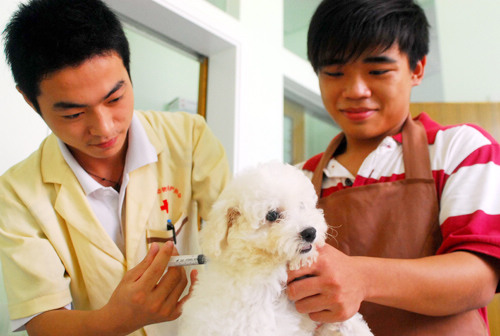|
 |
|
PRECAUTIONS: A dog is vaccinated at a pet hospital in Hainan Province (CFP) |
Hu Liangrong, a veterinary expert from the Academy of Military Medical Sciences, said that during one of his field trips to the countryside in Chongqing Municipality, he saw a man refusing to be vaccinated, even after his wife had died from rabies, because he couldn't afford the shots.
Even those who seek post-exposure vaccination often do not choose to receive rabies immuno-globulin shots and instead wait for the slow acting rabies vaccine to become effective. It is partially because the cost of immuno-globulin shots in China is prohibitive. For example, an adult weighing 60 kg would need an immuno-globulin shot costing 1,500 yuan ($234), five times more expensive than the rabies vaccines.
The Beijing News reported that only 10 percent of people with bleeding animal bites in China opt for the immuno-globulin injection.
Given the rising incidence of rabies, China has devoted a large amount of financial resources to the provision of anti-rabies vaccines.
According to statistics reported in the China Youth Daily, 15 million doses of human rabies vaccines are administered in China each year, accounting for 80 percent of total global consumption. The production and administration of human rabies vaccines cost the country more than 10 billion yuan ($1.56 billion) each year.
Actually, not all the people vaccinated against rabies in China really need the shots, said Yan Jiaxin, an expert on rabies from the Wuhan Institute of Biological Products. He estimated that 99.8 percent of the people who receive rabies shots have actually been bitten by healthy animals and don't need to be vaccinated.
The problem is how to identify the 0.2 percent of victims who really need immunization.
To prevent the overuse of the rabies vaccines, Yan suggested that offending animals should be confined and observed for signs of rabies for 10 days. In cases where the animal proves to be healthy the multiple-dose vaccination regimen should terminate. This method has been recommended by the WHO and adopted worldwide. However, its feasibility in China has been hampered by the lack of an effective canine rabies vaccination program.
"Dogs that bite human beings and behave strangely are often culled immediately. How can you implement a 10-day observation period?" Yan was asked by a colleague at a symposium in late September. Even if the offending animal is not killed, there are currently no regulations in China governing the confinement and observation of potentially rabid animals.
"Moreover, a 10-day observation period is feasible in countries where 70 percent of dogs are vaccinated against rabies while China's vaccination rates are much lower," said Xiao Donglou, a disease control official from the MOH. Although animal vaccines are much cheaper than human vaccines and can eliminate the disease at its source, dogs in China are poorly vaccinated. Yan estimated that 20 percent of dogs in China had been inoculated.
According to the WHO, the most cost-effective strategy for preventing rabies in people is by eliminating rabies in dogs through vaccination. Several Latin American countries have succeeded in dramatically reducing the number of human rabies cases by conducting extensive dog vaccination campaigns.
Disease control experts estimated that the cost of a vaccination campaign covering 70 percent of China's dogs, whose population is estimated at 100 million, stands at between 500 million yuan ($78 million) and 700 million yuan ($109 million), far below the current total expenditure on administering human rabies vaccines.
However, a key factor in China's unvaccinated dog population is the fact that the Ministry of Agriculture, which is responsible for vaccinating domestic animals, mainly focuses on farm animals such as cows and sheep. The MOH on the other hand focuses only on ensuring the adequate provision of the human rabies vaccines.
Xiao cautioned that vaccinating dogs in China may be more difficult than vaccinating humans as the country has a large population of stray and unconfined dogs.
"I don't understand how some local governments have the resources to have all the dogs culled instead of vaccinated," Yan said.
On September 27, the day before this year's World Rabies Day, the MOH organized a symposium to solicit experts' opinions on a draft national plan for rabies control. According to the draft, by 2015 China intends to reduce its human rabies cases by half and to achieve this goal, a joint working committee consisting of 14 government departments will be established. | 